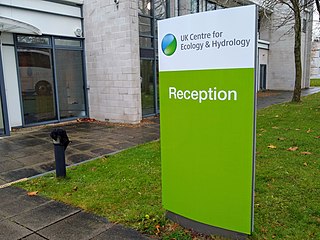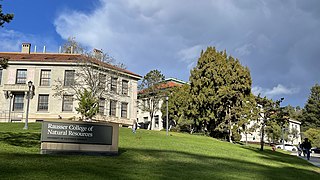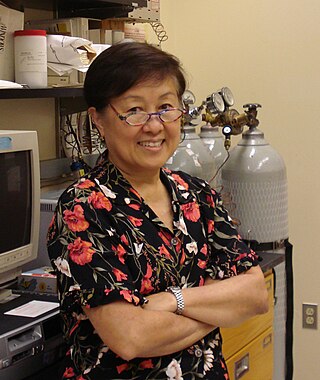
The School of Environmental and Biological Sciences (SEBS) is a constituent school of Rutgers University's New Brunswick-Piscataway campus. Formerly known as Cook College—which was named for George Hammell Cook, a professor at Rutgers in the 19th Century—it was founded as the Rutgers Scientific School and later College of Agriculture after Rutgers was named New Jersey's land-grant college under the Morrill Act of 1862. Today, unlike the other arts and sciences schools at Rutgers, the School of Environmental and Biological Sciences specializes in environmental science, animal science and other life sciences. Although physically attached to the New Brunswick-Piscataway campus, most of the SEBS campus lies in North Brunswick, New Jersey.

The UK Centre for Ecology & Hydrology (UKCEH) is a centre for excellence in environmental science across water, land and air. The organisation has a long history of investigating, monitoring and modelling environmental change, and its science makes a difference in the world. The issues that its science addresses include: air pollution, biodiversity, chemical risks in the environment, extreme weather events, droughts, floods, greenhouse gas emissions, soil health, sustainable agriculture, sustainable ecosystems, water quality, and water resources management.

The Oklahoma State University Ferguson College of Agriculture serves as the agricultural component of OSU-Stillwater in Stillwater, Oklahoma and operates within the university's Division of Agricultural Sciences and Natural Resources (DASNR). Agriculture has been a part of Oklahoma State University since the school's inception in 1890, when it was known as Oklahoma Agricultural & Mechanical College. Today the College of Agricultural Sciences and Natural Resources has emerged as one of the top agricultural institutions amongst Big 12 Conference schools and throughout the United States.
Daryl Bert Lund is an American food scientist and engineer who has served in various leadership positions within the Institute of Food Technologists, including President in 1990–1991 and editor-in-chief of the Journal of Food Science from 2003-2012. Lund was named one of 26 innovators in Food Engineering magazine's 75th anniversary edition in September 2003.
William H. Schlesinger is a biogeochemist and the retired president of the Cary Institute of Ecosystem Studies, an independent not-for-profit environmental research organization in Millbrook, New York. He assumed that position after 27 years on the faculty of Duke University, where he served as the Dean of the Nicholas School of the Environment and Earth Sciences and James B. Duke Professor of Biogeochemistry.

Lily Young is a distinguished professor of environmental microbiology at Rutgers New Brunswick. She is also a member of the administrative council at Rutgers University. She is the provost of Rutgers New Brunswick. She is a member of the Biotechnology Center for Agriculture and the Environment and has her academic appointment in the Department of Environmental Sciences.

Karl Maramorosch was an Austrian-born American virologist, entomologist, and plant pathologist. A centenarian and polyglot, he conducted research on viruses, mycoplasmas, rickettsiae, and other micro-organisms; and their transmission to plants through insect vectors in many parts of the world. He is the co-author of a textbook on techniques in virology and is the author of numerous papers on the biology and ecology of plant viruses, their hosts, and vectors. He received the Wolf Prize in Agriculture in 1980 for his contribution to the study of crop pathogens.

Victor Alphons Tiedjens (1895–1975) was an American horticulturist, agronomist, biochemist and soil chemist. He was credited as "one of the pioneers in growing plants in chemical solutions."

Jacob Goodale Lipman was a professor of agricultural chemistry and researcher in the fields of soil chemistry and bacteriology.
North Carolina State University's College of Agriculture and Life Sciences (CALS) is the fourth largest college in the university and one of the largest colleges of its kind in the nation, with nearly 3,400 students pursuing associate, bachelor's, master's and doctoral degrees and 1,300 on-campus and 700 off-campus faculty and staff members.

Tan Sri Zakri bin Abdul Hamid has had a distinguished career in science as a researcher, educator, administrator and diplomat.
Toppur Seethapathy Sadasivan was an Indian plant pathologist, academic and the director of the Centre for Advanced Studies in Botany of the University of Madras. He was the founder of the School of Physiological Plant Pathology at Madras University and was a recipient of the Shanti Swarup Bhatnagar Prize, the highest Indian award in the science category. He was an elected fellow of the Indian Academy of Sciences, Indian National Science Academy and Indian Botanical Society and an elected member of the Academy of Sciences Leopoldina. The Government of India awarded him the third highest civilian honour of the Padma Bhushan, in 1974, for his contributions to science.

Diana Harrison Wall is the founding director of the School of Global Environmental Sustainability, a distinguished biology professor, and senior research scientist at the Natural Resource Ecology Laboratory at Colorado State University. She is an environmental scientist and a soil ecologist and her research has focussed on the Antarctic McMurdo Dry Valleys. Wall investigates ecosystem processes, soil biodiversity and ecosystem services and she is interested in how these are impacted by global change. The Wall Valley was named after her in recognition of her research in the McMurdo Dry Valleys. Wall is a globally recognised leader and speaker on life in Antarctica and climate change.
Virendra Nath Pandey is an Indian geneticist, molecular virologist and enzymologist, known for his studies on the DNA recombinase enzyme complex. He is an associate professor at the New Jersey Medical School of the Rutgers University and a former scientist at Bhabha Atomic Research Center. The Council of Scientific and Industrial Research, the apex agency of the Government of India for scientific research, awarded him the Shanti Swarup Bhatnagar Prize for Science and Technology, one of the highest Indian science awards, in 1991, for his contributions to biological sciences.
Adesoji O. Adelaja is an academic and John A. Hannah Distinguished Professor in Land Policy at Michigan State University.

Ann M. Bartuska is an ecologist and biologist. She is a senior advisor at Resources for the Future and a former Deputy Under Secretary for Research, Education, and Economics (REE) at the United States Department of Agriculture and former USDA Chief Scientist.
Helene Roberts Dillard is an American plant pathologist, and academic. She is a fellow of the American Association for the Advancement of Science.
Joan Gardner Ehrenfeld was an American environmental scientist who was a professor at Rutgers University. Her research considered invasive species and ecology. She was elected Fellow of the American Association for the Advancement of Science in 2000.










